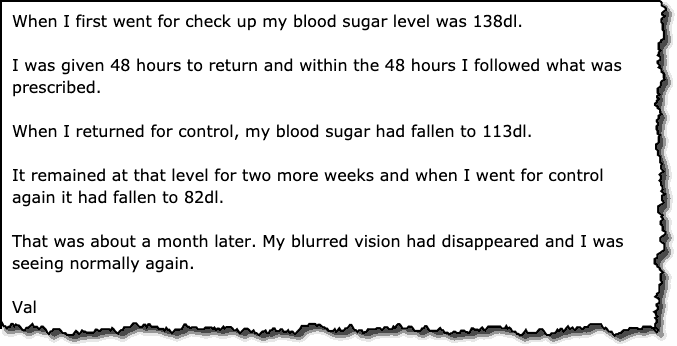
[cmamad id=”24778″ align=”center” tabid=”display-desktop” mobid=”display-desktop” stg=””]
This will make you sick, please read urgently…

—-Important Message from Our Sponsor—-
Men are using this one technique to give a woman an orgasm in just 30 seconds
She’ll swear she’s never felt this good before…
And she will be begging you to do it to her again and again.
In just 30 seconds, you will give her the most intense, toe-curling orgasm she’s ever had.
And from that moment on, she will be willing to do anything you want…
Here’s the one technique that will make her come in 30 seconds or less.

———-
Here’s why I never ask for a paper receipt at the store
BPA is a chemical that has been used in plastics and cash register receipts for decades.
It has similar effects in the body to estrogen.
Some people have been ringing the alarm bells about the effect of BPA on health for many years.
60 years after its introduction, scientists have begun to investigate the link between BPA and diabetes.
A recent human study found changes in insulin response as a result of BPA.

These researchers conducted human studies at the University of Missouri. The Journal of the Endocrine Society published the results.
We’ve been using BPA since 1957 for synthesizing plastics.
Plastic drinking bottles and thermal paper receipts are common sources of BPA.
Unless you are taking drastic steps to avoid it (or you live in the woods) you probably have some BPA in your body.
[cmamad id=”24779″ align=”center” tabid=”display-desktop” mobid=”display-desktop” stg=””]
Previous research did show a link between BPA and type 2 diabetes.
“Human cross-sectional and animal studies have shown an association of BPA with insulin resistance, type 2 diabetes, and other metabolic diseases.”
Some studies showed that pancreatic cells of mice and humans responded differently to sugar after BPA exposure.
Before this particular study, there were no studies looking directly at the effect of BPA on insulin in humans.
“No human experimental study has investigated whether BPA alters insulin/C-peptide secretion.”
The study looked at the effect of BPA on insulin in men and women.
“Men and post-menopausal women (non-diabetic) were orally administered either the vehicle or a BPA dose of 50-µg/kg body weight.”
US regulatory bodies consider this amount of BPA to be the maximum safe daily dose.
“50-µg/kg body weight has been predicted by the FDA and EPA to be the maximum safe daily oral BPA dose over the lifetime.”
The researchers looked at the insulin response to glucose after BPA exposure.
They used two common tests of insulin response.
“To assess insulin response we used an oral glucose tolerance test and a hyperglycemic clamp.”
After exposure to BPA, the participants had blood levels of BPA found in much of the population.
“BPA after experimental exposure was at levels detected in human biomonitoring studies.”
The oral glucose tolerance test showed changes in insulin secretion caused by BPA.
“Test 1 showed a positive correlation between HbA1c and the percent change in insulin genetic index.”
That test looks at the short-term behavior of insulin after sugar exposure.
The second experiment looked at insulin response at a later stage.
The second test also showed changes in insulin response after BPA exposure.
“Several measures of insulin and C-peptide appeared suppressed during the BPA session relative to the control session.”
BPA within a “safe range” alters insulin secretion…
“This study suggests that BPA exposure to a dose considered safe by US regulators may alter glucose-stimulated insulin response in humans.”
These results show that BPA could have detrimental effects on type 2 diabetes and other metabolic disorders.
Other studies have shown that BPA can cause damage to the reproductive system. It alters sex hormones and thyroid hormone.
There are also strong links between BPA exposure and increased cancer risk.
In the last 10 years, more people have become aware of the risks of BPA exposure.
Because of this, some plastics manufacturers have tried to use different chemicals in place of BPA.
Recently, some health-conscious manufacturers have been selling “BPA-free” plastic products.
But most of the replacements for BPA are just as bad.
Recent studies show that BPA replacements (BPF and BPS) have similar effects to BPA.
So “BPA-free” plastics are probably not safer.
Much of our exposure to these chemicals comes from plastic food and drink containers.
Avoid these whenever possible.
Another source of exposure is thermal receipt paper.
This type of paper has a lot of BPA and you should minimize your contact with. Wash your hands after using receipts.
You should always consult a healthcare professional about treating and diagnosing health problems.
—-Important Message for Men with Diabetes or Prediabetes—-
This special breakfast stops diabetes symptoms in men
Research shows that vitamin K2 lowers blood sugar naturally.
And that’s why this special breakfast works so well.
It’s rich in vitamin K2 and it can completely reverse diabetes symptoms in men, even type 2.
Here’s what my student Val is saying about this diabetes-reversing breakfast:

Here’s what to eat every morning for breakfast to reverse your diabetes symptoms naturally.
———-

- Experimental BPA Exposure and Glucose-Stimulated Insulin Response in Adult Men and Women
https://academic.oup.com/jes/advance-article/doi/10.1210/js.2018-00151/5094959
- Bisphenol A (BPA)
https://www.niehs.nih.gov/health/topics/agents/sya-bpa/index.cfm - Bisphenol A facts
http://med.stanford.edu/news/all-news/2008/04/bisphenol-a-facts.html
